Coronavirus: The taxi drivers left 'desperate' by the lockdown
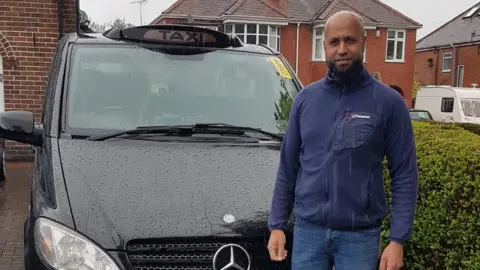 Faisal Riaz
Faisal RiazSeven weeks into lockdown, streets across the UK remain quiet in a bid to stem the spread of coronavirus - and some taxi drivers have said they are "desperate" without business.
Some have cut their working hours by more than half while others have had to give up work altogether.
The RMT - the union that represents many transport workers - said 80,000 taxi drivers in the UK were in danger of becoming destitute because of the lockdown.
Generally self-employed, drivers may be able to claim 80% of their earnings under government measures - but will not receive that money until June.
"We are key workers, I think - all the people that are going to work, we take them," Faisal Riaz said. "But there's no mention of us."
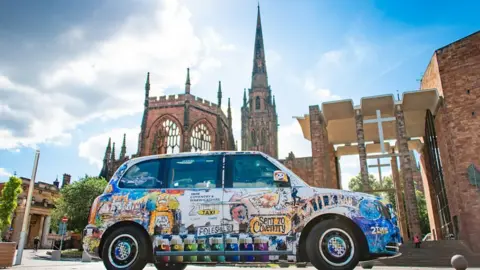
After 20 years behind the wheel, Mr Riaz has given up driving his black cab in Coventry.
"We rely on the ranks," he said. "The towns are dead, our city is dead. There's no point working."
He stopped working as soon as the lockdown was announced and has now been out of work for seven weeks.
Living at home with his two young children and his 73-year-old mother, Mr Riaz decided going to work was not worth the risk for him.
"You don't know who you're picking up," he said. "We're in the hot spot."
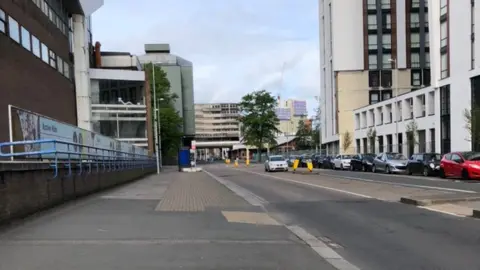
However the decision to put the brakes on his driving career has not been without financial implications.
"It's desperate," Mr Riaz said. "Savings can only stretch so far - I've got a mortgage, kids, bills still need paying."
His wife, a driving instructor, has also had to stop working. Both are self-employed and are waiting until June when they hope to be able to receive a taxable grant provided by the government.
The grant would be worth 80% of self-employed workers' profits up to a cap of £2,500 per month, which initially will be available for three months in one lump-sum payment.
By June, however, Mr Riaz said he would have lost three months' pay.
"There's nothing for taxi drivers," he said. "There's no support."
 Nahid Chowdry
Nahid ChowdryNahid Chowdry has been driving taxis in Solihull since moving to the UK in 2009.
Since the lockdown, he said "work is completely dead" but nevertheless he "forces" himself to go to work.
Mr Chowdry made only about £15 one morning, and has been working four-hour days instead of 10. For the first time, he has had to apply for Universal Credit.
"I appreciate whatever help I get," he said, but added most of that money had gone on insurance - which cost him more than £300 a month.
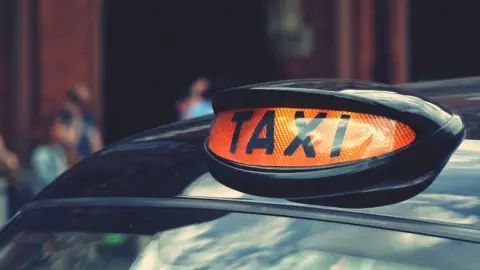 Getty Images
Getty ImagesMr Chowdry, who lives in Birmingham, does not own his cab, instead he has rented it from a taxi firm which he said had dropped the weekly rental fee. But he still felt companies could do more to keep their drivers safe.
He said he was scared of being exposed to coronavirus and passing it on to his children and said firms "don't provide any type of help".
"They just tell us to keep the car clean but nobody talks about us," he said.
After every passenger leaves the cab, Mr Chowdry cleans the door handles and uses hand and air sanitiser but he said he thought "more could have been done".
"It is scary," he said. "I'm scared when I go to my house and see my kids."
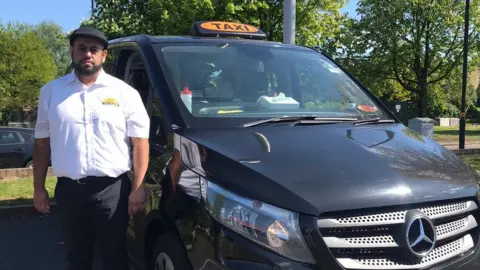 Sajid Hussain
Sajid HussainSajid Hussain has been a cabbie in Birmingham and Solihull for almost 15 years.
In October, he spent £30,000 on a new car that would be compliant with the proposed Clean Air Zone in Birmingham.
"Now I'm taking home about £30 a day, maximum," he said. "I'll probably have to sell the car."
The charge for high-polluting vehicles for entering the city centre has been pushed back until 2021, however the RMT has called on Birmingham City Council to reconsider charges for older taxis as many drivers would not be able to afford new ones.
For now Mr Hussain will keep on driving though. He has three children and a wife to support so has been continuing to work every day, for 10 hours at a time, but said he was starting to think more seriously about a career change.
 Getty Images
Getty Images"In Solihull, there's no work at all," Mr Hussain said. In Birmingham, he said, at least he occasionally picked up fares from key workers at New Street Station - but it was not enough to stay afloat.
"It's stressful, we're just surviving. I will be in debt."
Taxi drivers have been forgotten, he said. "No-one cares, it's just devastating."
The RMT has made representations to the Department for Transport and councils for payments to be made to taxi drivers.
"The market just is not there," Ken Usher, the union's regional organiser for the West Midlands, said.
"This current worldwide health pandemic is having such a profound and devastating effect on our city and our members' financial security," Mr Usher wrote in a letter to Birmingham City Council.
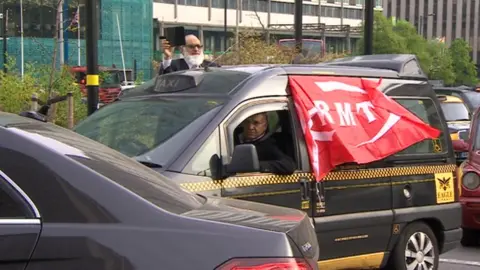
All of the drivers believed coronavirus was a "game changer" for the taxi industry.
Mr Riaz estimated it would take up to two years for him to financially recover but said there would be even longer lasting implications.
"I'll feel anxious going back to work," he said. "I'm going to think twice about it when people pass me money, I think we'll always be wearing masks."

- A SIMPLE GUIDE: How do I protect myself?
- AVOIDING CONTACT: The rules on self-isolation and exercise
- HOPE AND LOSS: Your coronavirus stories
- LOOK-UP TOOL: Check cases in your area
- TESTING: Can I get tested for coronavirus?

Follow BBC West Midlands on Facebook, Twitter and Instagram. Send your story ideas to: [email protected]
